27 apr 2015
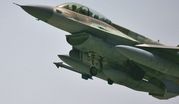
Israel struck missile batteries belonging to Hezbollah and the Syrian army in the Qalamoun area, near the Syria-Lebanon border, late Sunday night, an unconfirmed Al Jazeera report said early on Monday. The report said there were several casualties.
According to Haaretz, IOF Spokesperson's Unit would not confirm or deny, saying they do not comment on foreign reports.
This is the third attack in Syria in the past three days that was attributed to Israel. But unlike the two other strikes, it seems that this report is less credible.
The attack came hours after an Israeli Air Force aircraft struck a militant cell that was trying to place an explosive device on Israel's border with Syria.
Around 9:30 P.M. Israeli troops watching the border noticed four figures approaching the fence between Israel and Syria and placing the bomb. The cell was on the eastern side of the fence, but in effect was on Israeli territory.
The IAF aircraft then struck the cell, killing three of the militants, according to the IDF. In all likelihood the fourth militant was also hit.
The reported airstrike is Israel's second strike on Hezbollah targets in Qalamoun in three days. Israeli Air Force reportedly attacked Syrian army bases where Hezbollah stored long-range missiles late Friday night.
The airstrikes reportedly targeted the bases of the 155th and 65th strategic missile brigades, stationed in Qalamoun, near the Syria-Lebanon border. Residents of nearby cities Yabroud and Qarah reported hearing explosions.
According to an Al Arabiya report, Friday night's strikes were preceded by another attack on Wednesday, targeting a Hezbollah convoy carrying weapons. According to the report, at least one person was killed in that attack.
Last month, in wake of the Lausanne talks concerning Iran's nuclear program, Prime Minister Benjamin Netanyahu said that "we [in Israel] are not closing our eyes, and we will continue to act against any threat."
According to Haaretz, IOF Spokesperson's Unit would not confirm or deny, saying they do not comment on foreign reports.
This is the third attack in Syria in the past three days that was attributed to Israel. But unlike the two other strikes, it seems that this report is less credible.
The attack came hours after an Israeli Air Force aircraft struck a militant cell that was trying to place an explosive device on Israel's border with Syria.
Around 9:30 P.M. Israeli troops watching the border noticed four figures approaching the fence between Israel and Syria and placing the bomb. The cell was on the eastern side of the fence, but in effect was on Israeli territory.
The IAF aircraft then struck the cell, killing three of the militants, according to the IDF. In all likelihood the fourth militant was also hit.
The reported airstrike is Israel's second strike on Hezbollah targets in Qalamoun in three days. Israeli Air Force reportedly attacked Syrian army bases where Hezbollah stored long-range missiles late Friday night.
The airstrikes reportedly targeted the bases of the 155th and 65th strategic missile brigades, stationed in Qalamoun, near the Syria-Lebanon border. Residents of nearby cities Yabroud and Qarah reported hearing explosions.
According to an Al Arabiya report, Friday night's strikes were preceded by another attack on Wednesday, targeting a Hezbollah convoy carrying weapons. According to the report, at least one person was killed in that attack.
Last month, in wake of the Lausanne talks concerning Iran's nuclear program, Prime Minister Benjamin Netanyahu said that "we [in Israel] are not closing our eyes, and we will continue to act against any threat."

Update
Palestinian medical sources have reported that a young man was shot and injured, on Monday evening, by Israeli soldiers in the al-‘Arqa village, near the northern West Bank city of Jenin. In addition, the Army kidnapped a child in Jerusalem.
Head of the Emergency Unit of the Red Crescent Society in Jenin Mahmoud Sa’di said the soldiers shot Mohammad Murad Yahia, 21 years of age, in an orchard near a section of the Annexation Wall that isolated the Palestinians from their lands.
He added that Yahia was moved to the Khalil Suleiman Governmental Hospital, in Jenin, suffering a critical injury.
In addition, soldiers detained two brothers, identified as Ayman and Emad Mahmoud Saleh, while in their family’s land, isolated by the Annexation Wall.
In related news, soldiers kidnapped a Palestinian child in Wad al-Jouz neighborhood, in occupied East Jerusalem, after invading it, and clashing with local youths.
The soldiers also fired rubber-coated metal bullets and gas bombs, causing a number of residents to suffer the effects of tear gas inhalation.
Palestinian medical sources have reported that a young man was shot and injured, on Monday evening, by Israeli soldiers in the al-‘Arqa village, near the northern West Bank city of Jenin. In addition, the Army kidnapped a child in Jerusalem.
Head of the Emergency Unit of the Red Crescent Society in Jenin Mahmoud Sa’di said the soldiers shot Mohammad Murad Yahia, 21 years of age, in an orchard near a section of the Annexation Wall that isolated the Palestinians from their lands.
He added that Yahia was moved to the Khalil Suleiman Governmental Hospital, in Jenin, suffering a critical injury.
In addition, soldiers detained two brothers, identified as Ayman and Emad Mahmoud Saleh, while in their family’s land, isolated by the Annexation Wall.
In related news, soldiers kidnapped a Palestinian child in Wad al-Jouz neighborhood, in occupied East Jerusalem, after invading it, and clashing with local youths.
The soldiers also fired rubber-coated metal bullets and gas bombs, causing a number of residents to suffer the effects of tear gas inhalation.
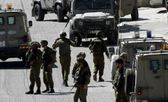
Israeli soldiers invaded, on Monday evening, the Aida refugee camp, north of the West Bank city of Bethlehem, broke into homes, and destroyed doors of a number of stores, before searching them.
Local sources said the soldiers damaged the doors of a number of shops, and a car repair garage, and violently searched them causing excessive property damage.
The sources added that the soldiers destroyed and removed the doors by tying them with iron chains attached to their armored vehicles.
In addition, soldiers invaded three homes, belonging to Mohammad Ahmad al-Ghoushi, Mousa Monir Ja’ara and Jamil Jawarish, before searching and ransacking them.
Local sources said the soldiers damaged the doors of a number of shops, and a car repair garage, and violently searched them causing excessive property damage.
The sources added that the soldiers destroyed and removed the doors by tying them with iron chains attached to their armored vehicles.
In addition, soldiers invaded three homes, belonging to Mohammad Ahmad al-Ghoushi, Mousa Monir Ja’ara and Jamil Jawarish, before searching and ransacking them.

Israeli soldiers kidnapped, on Monday at dawn, two young Palestinian men, and a child, in occupied East Jerusalem, and violently searched homes before attacking several family members, causing injuries.
The Wadi Hilweh Information Center in Silwan (Silwanic) said the soldiers kidnapped a child identified as Mo’men Abu Hasheema, from Jerusalem’s Old City, after violently searching his family’s home.
In addition, the soldiers kidnapped Mohammad Ali Ata, 18 years of age, after invading his home, also in the Old City, and Ahmad Wisam Oweisat, 21, in Jabal al-Mokabber.
Silwanic stated that the soldiers surrounded the homes before invading them, and kidnapped the three Palestinians.
Undercover soldiers of the Israeli military also assaulted several members of the ‘Oweisat family, before kidnapping Ahmad.
Silwanic said the soldiers clubbed and beat Oweisat’s 66 years of age grandmother, in addition to Dina Ahmad ‘Oweisat, 13, Mahmoud Ahmad ‘Oweisat, 18, and Mohammad Ahmad ‘Oweisat, 16, causing various cuts and bruises.
The soldiers violently searched the homes for more than 40 minutes, causing excessive damage, while many Palestinians, especially the children, suffered anxiety attacks.
It is worth mentioning that the soldiers also kidnapped three Palestinians in the northern West Bank city of Nablus; the army said the three are members of the Hamas movement.
Also on Monday at dawn, the army kidnapped four Palestinians in the northern West Bank district of Jenin, while one Palestinian from the West Bank district of Bethlehem has been kidnapped in occupied Jerusalem.
The Wadi Hilweh Information Center in Silwan (Silwanic) said the soldiers kidnapped a child identified as Mo’men Abu Hasheema, from Jerusalem’s Old City, after violently searching his family’s home.
In addition, the soldiers kidnapped Mohammad Ali Ata, 18 years of age, after invading his home, also in the Old City, and Ahmad Wisam Oweisat, 21, in Jabal al-Mokabber.
Silwanic stated that the soldiers surrounded the homes before invading them, and kidnapped the three Palestinians.
Undercover soldiers of the Israeli military also assaulted several members of the ‘Oweisat family, before kidnapping Ahmad.
Silwanic said the soldiers clubbed and beat Oweisat’s 66 years of age grandmother, in addition to Dina Ahmad ‘Oweisat, 13, Mahmoud Ahmad ‘Oweisat, 18, and Mohammad Ahmad ‘Oweisat, 16, causing various cuts and bruises.
The soldiers violently searched the homes for more than 40 minutes, causing excessive damage, while many Palestinians, especially the children, suffered anxiety attacks.
It is worth mentioning that the soldiers also kidnapped three Palestinians in the northern West Bank city of Nablus; the army said the three are members of the Hamas movement.
Also on Monday at dawn, the army kidnapped four Palestinians in the northern West Bank district of Jenin, while one Palestinian from the West Bank district of Bethlehem has been kidnapped in occupied Jerusalem.
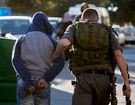
Israeli soldiers kidnapped, earlier on Monday, in the northern West Bank district of Jenin, and one Palestinian in occupied Jerusalem. Clashes and home invasions have been reported in Jenin.
The soldiers kidnapped a resident, identified as Aman Tamim Hardan, 27, from Jenin city, after stopping him on a roadblock near Shavei Shomron illegal colony, near Jenin.
The soldiers also kidnapped Anas Abdul-Raouf ‘Abady, 23, from Toura village, while trying to cross the Barta’a roadblock.
A third Palestinian, identified as Mohammad Mahmoud Qabaha, 32, also from Toura, was kidnapped on the military roadblock, installed on the main entrance of Om ar-Reehan village, in Ya’bad, south of Jenin.
In addition, soldiers kidnapped Abed Bassam Abu Obeid, 20, after storming and searching his home in Jenin city.
Also in Jenin, soldiers invaded homes of three former political prisoners, searched the properties, and threatened to arrest them “should they continue their political activities.”
The three have been identified as Hamza, 43, his brother Anas Qa’qour, 28, and Mustafa al-Wazni.
Clashes took place between the soldiers and local youths, in Zayed Junction area, and Wad Ezzeddin, in Jenin; the soldiers fired concussion grenades and rubber-coated metal bullets, no injuries were reported.
In related news, soldiers kidnapped a Palestinian worker, in occupied Jerusalem, allegedly for entering and working in the city without a permit.
The Kidnapped Palestinian has been identified as Nadim Adam Issa, 28 years of age, from the al-Khader town, south of Bethlehem.
The Israeli army conducts daily invasions, and arrests, in different parts of the occupied territories.
Most of the abductions take place after the soldiers storm and ransack homes, while many arrests take place on roadblocks.
The soldiers kidnapped a resident, identified as Aman Tamim Hardan, 27, from Jenin city, after stopping him on a roadblock near Shavei Shomron illegal colony, near Jenin.
The soldiers also kidnapped Anas Abdul-Raouf ‘Abady, 23, from Toura village, while trying to cross the Barta’a roadblock.
A third Palestinian, identified as Mohammad Mahmoud Qabaha, 32, also from Toura, was kidnapped on the military roadblock, installed on the main entrance of Om ar-Reehan village, in Ya’bad, south of Jenin.
In addition, soldiers kidnapped Abed Bassam Abu Obeid, 20, after storming and searching his home in Jenin city.
Also in Jenin, soldiers invaded homes of three former political prisoners, searched the properties, and threatened to arrest them “should they continue their political activities.”
The three have been identified as Hamza, 43, his brother Anas Qa’qour, 28, and Mustafa al-Wazni.
Clashes took place between the soldiers and local youths, in Zayed Junction area, and Wad Ezzeddin, in Jenin; the soldiers fired concussion grenades and rubber-coated metal bullets, no injuries were reported.
In related news, soldiers kidnapped a Palestinian worker, in occupied Jerusalem, allegedly for entering and working in the city without a permit.
The Kidnapped Palestinian has been identified as Nadim Adam Issa, 28 years of age, from the al-Khader town, south of Bethlehem.
The Israeli army conducts daily invasions, and arrests, in different parts of the occupied territories.
Most of the abductions take place after the soldiers storm and ransack homes, while many arrests take place on roadblocks.
26 apr 2015
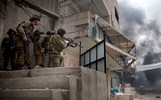
Extremist Jewish groups of settlers attacked at dawn Sunday the houses of Palestinians in al-Khalil city in the southern West Bank. Meanwhile, Israeli Occupation Forces (IOF) stormed Aroub refugee camp to the north of the city.
Local sources revealed that extremist settlers attacked houses in the Old City of al-Khalil and tried to assault its residents.
The settlers also assaulted a number of citizens in the city in the wake of stabbing an Israeli soldier by a Palestinian man, killed immediately by the IOF soldiers, near al-Haram al-Ibrahimi Mosque on Saturday.
On the other hand, the Israeli forces raided the Aroub camp and handed summonses to a number of Palestinian youths.
Local sources said the IOF stormed the camp and soldiers broke into Palestinians’ homes for search purposes amid intimidation of its residents. They delivered summonses to a number of young men to be questioned at the Israeli intelligence headquarters.
The Israeli forces were heavily deployed at the entrances of the Aroub refugee camp during the storming operation, the sources added.
Local sources revealed that extremist settlers attacked houses in the Old City of al-Khalil and tried to assault its residents.
The settlers also assaulted a number of citizens in the city in the wake of stabbing an Israeli soldier by a Palestinian man, killed immediately by the IOF soldiers, near al-Haram al-Ibrahimi Mosque on Saturday.
On the other hand, the Israeli forces raided the Aroub camp and handed summonses to a number of Palestinian youths.
Local sources said the IOF stormed the camp and soldiers broke into Palestinians’ homes for search purposes amid intimidation of its residents. They delivered summonses to a number of young men to be questioned at the Israeli intelligence headquarters.
The Israeli forces were heavily deployed at the entrances of the Aroub refugee camp during the storming operation, the sources added.
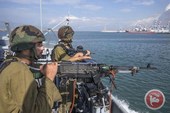
Israeli forces opened fire on Palestinian fishermen and farmers in the Gaza Strip Sunday morning, with no injuries reported.
Witnesses reported that Israeli naval forces fired on fishing boats four miles off the coast, resulting in damage to the boats that forced the fisherman to return to land. Meanwhile, Israeli border forces fired smoke bombs at farmers' land east of Maghazi refugee camp in the central Gaza Strip.
Israeli forces have repeatedly opened fire on Palestinian fisherman and farmers since the ceasefire agreement signed Aug. 26, 2014 that ended a devastating 50-day war between Israel and Hamas.In March alone, there were a total of 38 incidents of shootings, incursions into the Strip, and arrests, according to the Palestinian Center for Human Rights (PCHR).
That was up from 26 incidents through February, and left seven Palestinians injured and one dead.The attacks come despite Israeli promises at the end of the ceasefire to ease restrictions on Palestinian access to both the sea and the border region near the "security buffer zone.
"Israel promised to expand the Palestinian fishing zone to six nautical miles, falling far short of the 20 nautical miles initially agreed under the Oslo Accord.According to PCHR, the "buffer zone," which Palestinians are prohibited from entering, "is illegal under both Israeli and international law."The group said: "The precise area designated by Israel as a 'buffer zone' is not clear and this Israeli policy is typically enforced with live fire."
Witnesses reported that Israeli naval forces fired on fishing boats four miles off the coast, resulting in damage to the boats that forced the fisherman to return to land. Meanwhile, Israeli border forces fired smoke bombs at farmers' land east of Maghazi refugee camp in the central Gaza Strip.
Israeli forces have repeatedly opened fire on Palestinian fisherman and farmers since the ceasefire agreement signed Aug. 26, 2014 that ended a devastating 50-day war between Israel and Hamas.In March alone, there were a total of 38 incidents of shootings, incursions into the Strip, and arrests, according to the Palestinian Center for Human Rights (PCHR).
That was up from 26 incidents through February, and left seven Palestinians injured and one dead.The attacks come despite Israeli promises at the end of the ceasefire to ease restrictions on Palestinian access to both the sea and the border region near the "security buffer zone.
"Israel promised to expand the Palestinian fishing zone to six nautical miles, falling far short of the 20 nautical miles initially agreed under the Oslo Accord.According to PCHR, the "buffer zone," which Palestinians are prohibited from entering, "is illegal under both Israeli and international law."The group said: "The precise area designated by Israel as a 'buffer zone' is not clear and this Israeli policy is typically enforced with live fire."
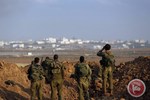
Israeli forces shot and injured a Palestinian man east of Beit Hanoun in the northern Gaza Strip on Sunday.
A Ministry of Health spokesman, Dr. Ashraf al-Qudra, said that the 37-year-old man had been shot in his right foot in the Abu Safiya area east of Beit Hanoun.Al-Qudra said the injured man had been moved to Kamal Adwan hospital for treatment, and described his condition as moderate.
The injury came as Israeli forces opened fire on fishermen and farmers across the Gaza Strip.Witnesses reported that Israeli naval forces fired on fishing boats four miles off the coast, damaging the boats and forcing the fisherman to return to land.
Meanwhile, Israeli border forces fired smoke bombs at farmers' land east of Maghazi refugee camp in the central Gaza Strip.
Israeli forces have repeatedly opened fire on Gazans since the ceasefire agreement signed Aug. 26, 2014 that ended a devastating 50-day war between Israel and Hamas.In March alone, there were a total of 38 incidents of shootings, incursions into the coastal enclave, and arrests, according to the Palestinian Center for Human Rights (PCHR).
That was up from 26 incidents through February, and left seven Palestinians injured and one dead.The attacks come despite Israeli promises at the end of the ceasefire to ease restrictions on Palestinian access to both the sea and the border region near the "security buffer zone."
A Ministry of Health spokesman, Dr. Ashraf al-Qudra, said that the 37-year-old man had been shot in his right foot in the Abu Safiya area east of Beit Hanoun.Al-Qudra said the injured man had been moved to Kamal Adwan hospital for treatment, and described his condition as moderate.
The injury came as Israeli forces opened fire on fishermen and farmers across the Gaza Strip.Witnesses reported that Israeli naval forces fired on fishing boats four miles off the coast, damaging the boats and forcing the fisherman to return to land.
Meanwhile, Israeli border forces fired smoke bombs at farmers' land east of Maghazi refugee camp in the central Gaza Strip.
Israeli forces have repeatedly opened fire on Gazans since the ceasefire agreement signed Aug. 26, 2014 that ended a devastating 50-day war between Israel and Hamas.In March alone, there were a total of 38 incidents of shootings, incursions into the coastal enclave, and arrests, according to the Palestinian Center for Human Rights (PCHR).
That was up from 26 incidents through February, and left seven Palestinians injured and one dead.The attacks come despite Israeli promises at the end of the ceasefire to ease restrictions on Palestinian access to both the sea and the border region near the "security buffer zone."
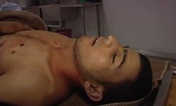
Violent clashes burst out in the Old City of al-Khalil south of the West Bank on Saturday evening after the news spread of the Israeli shooting to death of a young man.
According to local sources in the city, the clashes were close to Abu Sneineh neighborhood amid an intensive presence of Israeli soldiers all over the Old City where live ammunition, rubber bullets, and tear gas grenades were heavily fired towards Palestinian youths who attacked the soldiers.
The sources also affirmed that the Israeli occupation forces (IOF) declared the Old City a closed military zone, announced a state of alert and imposed a curfew amid tight security measures.
According to Israeli army sources, Mahmoud Abu Juhaisha, a Palestinian youth, stabbed an Israeli officer at a military checkpoint. The officer sustained four stab wounds and his condition was described as critical.
Israeli soldiers present at the scene immediately fired at the youth and he was hit with five bullets that killed him on the spot.
According to eyewitnesses, the Israeli army at dawn Sunday stormed and provocatively searched Abu Juhaisha's house while most of his family members were at hospital to identify their son's body which was handed over by the IOF late Saturday night.
In the same context, local sources said that the Israeli Occupation Authorities (IOA) reneged on handing over the body of the minor Ali Abu Ghannam who was killed at dawn Saturday close to al-Zayyim checkpoint in Occupied Jerusalem. His family refused to receive his body Saturday morning as the IOA conditioned that only 20 Jerusalemites may participate in his funeral.
A state of tension has prevailed in the Old City of al-Khalil after Abu Juhaisha's death and settlers attacked Palestinian houses, hurled stones at Palestinian citizens, and assaulted the journalists who were in the area.
According to local sources in the city, the clashes were close to Abu Sneineh neighborhood amid an intensive presence of Israeli soldiers all over the Old City where live ammunition, rubber bullets, and tear gas grenades were heavily fired towards Palestinian youths who attacked the soldiers.
The sources also affirmed that the Israeli occupation forces (IOF) declared the Old City a closed military zone, announced a state of alert and imposed a curfew amid tight security measures.
According to Israeli army sources, Mahmoud Abu Juhaisha, a Palestinian youth, stabbed an Israeli officer at a military checkpoint. The officer sustained four stab wounds and his condition was described as critical.
Israeli soldiers present at the scene immediately fired at the youth and he was hit with five bullets that killed him on the spot.
According to eyewitnesses, the Israeli army at dawn Sunday stormed and provocatively searched Abu Juhaisha's house while most of his family members were at hospital to identify their son's body which was handed over by the IOF late Saturday night.
In the same context, local sources said that the Israeli Occupation Authorities (IOA) reneged on handing over the body of the minor Ali Abu Ghannam who was killed at dawn Saturday close to al-Zayyim checkpoint in Occupied Jerusalem. His family refused to receive his body Saturday morning as the IOA conditioned that only 20 Jerusalemites may participate in his funeral.
A state of tension has prevailed in the Old City of al-Khalil after Abu Juhaisha's death and settlers attacked Palestinian houses, hurled stones at Palestinian citizens, and assaulted the journalists who were in the area.
25 apr 2015
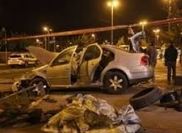
Car crash in Jerusalem
Israeli sources have reported that four police officers were injured, on Saturday at night, in the at-Tour neighborhood, in occupied Jerusalem, in the area where clashes took place earlier between Palestinians and the army.
Palestinian medical sources said dozens of Palestinians have been injured during clashes in different areas of occupied Jerusalem.
Israeli Ynet News said the incident took place near the Mount of Olives, and that three of the officers suffered mild injuries, and one suffered moderate wounds on her lower limbs.
Clashes took place in the area after more police units, and ambulances, rushed to the scene to evacuate the wounded officers.
More clashes took place in Silwan, and the Muslim Quarter of occupied East Jerusalem.
The Ynet News Agency also said the, following the attack, police fired live rounds toward the vehicle, and conducted searches in the area before locating the car, but did not locate the driver.
The incident comes amidst increasing tension in occupied Jerusalem after the police shot and killed, on Friday at night a Palestinian teen, allegedly, after he attempted to stab soldiers. His family and eyewitnesses refuted the Israeli claim.
According to Ynet News, a Molotov cocktail was also thrown at an Israeli settlement bus, on Route 443 heading to Jerusalem. The bus caught fire; no injuries were reported.
On Friday at night, Israeli soldiers shot and killed a young Palestinian named Ali Sa'id Abu Ghannam, 16 years of age, near the Zaim military roadblock, east of occupied Jerusalem.
On Saturday at dawn, the army invaded the home of the slain Palestinian teen, kidnapped his father, and placed preconditions for transferring the child’s body to his family; the family refused the Israeli preconditions.
Late on Saturday night, clashes took place in different villages and neighborhoods in occupied East Jerusalem, after the police used excessive force against Palestinians protesting the death of Ali Abu Ghannam.
Thaer Fasfous, spokesperson of the Fateh Movement in the Shu’fat refugee camp, said clashes took place near the Shu’fat Israeli military roadblock, and that the soldiers fired rounds of live ammunition, gas bombs, and rubber-coated metal bullets.
Medical sources have reported that at least twenty Palestinians have been injured by army fire, including a young man was shot in the head by a rubber-coated metal bullet, and was moved to a hospital for treatment.
Clashes also took place in Jabal al-Mokabber village after dozens of soldiers invaded it, and fired flares, in addition to several sounds of live ammunition.
The Wadi Hilweh Information Center in Silwan (Silwanic) said settlement guards fired rounds of live ammunition into the al-‘Ein al-Foqa area in the town, and that a number of Palestinian youths threw Molotov cocktails into an illegal settlement outpost.
Silwanic added that clashes also took place in ‘Ein al-Lowza area in Silwan, and that the soldiers fired rubber-coated metal bullets on a number of homes, and invaded at least one. Similar clashes took place in Bab Hatta neighborhood, and the al-Wad Street, in Jerusalem’s Old City. Police officers and soldiers also broke into homes in the African Neighborhood and searched them; allegedly looking for Palestinians who used fireworks against the army during clashes that took place in the area.
On Saturday evening, soldiers shot and killed a Palestinian who allegedly stabbed a border police officer “in the head and chest” near the Ibrahimi Mosque in Hebron. Israeli sources said the wounded soldier was moved to a medical center, suffering a moderate injury.
Israeli sources have reported that four police officers were injured, on Saturday at night, in the at-Tour neighborhood, in occupied Jerusalem, in the area where clashes took place earlier between Palestinians and the army.
Palestinian medical sources said dozens of Palestinians have been injured during clashes in different areas of occupied Jerusalem.
Israeli Ynet News said the incident took place near the Mount of Olives, and that three of the officers suffered mild injuries, and one suffered moderate wounds on her lower limbs.
Clashes took place in the area after more police units, and ambulances, rushed to the scene to evacuate the wounded officers.
More clashes took place in Silwan, and the Muslim Quarter of occupied East Jerusalem.
The Ynet News Agency also said the, following the attack, police fired live rounds toward the vehicle, and conducted searches in the area before locating the car, but did not locate the driver.
The incident comes amidst increasing tension in occupied Jerusalem after the police shot and killed, on Friday at night a Palestinian teen, allegedly, after he attempted to stab soldiers. His family and eyewitnesses refuted the Israeli claim.
According to Ynet News, a Molotov cocktail was also thrown at an Israeli settlement bus, on Route 443 heading to Jerusalem. The bus caught fire; no injuries were reported.
On Friday at night, Israeli soldiers shot and killed a young Palestinian named Ali Sa'id Abu Ghannam, 16 years of age, near the Zaim military roadblock, east of occupied Jerusalem.
On Saturday at dawn, the army invaded the home of the slain Palestinian teen, kidnapped his father, and placed preconditions for transferring the child’s body to his family; the family refused the Israeli preconditions.
Late on Saturday night, clashes took place in different villages and neighborhoods in occupied East Jerusalem, after the police used excessive force against Palestinians protesting the death of Ali Abu Ghannam.
Thaer Fasfous, spokesperson of the Fateh Movement in the Shu’fat refugee camp, said clashes took place near the Shu’fat Israeli military roadblock, and that the soldiers fired rounds of live ammunition, gas bombs, and rubber-coated metal bullets.
Medical sources have reported that at least twenty Palestinians have been injured by army fire, including a young man was shot in the head by a rubber-coated metal bullet, and was moved to a hospital for treatment.
Clashes also took place in Jabal al-Mokabber village after dozens of soldiers invaded it, and fired flares, in addition to several sounds of live ammunition.
The Wadi Hilweh Information Center in Silwan (Silwanic) said settlement guards fired rounds of live ammunition into the al-‘Ein al-Foqa area in the town, and that a number of Palestinian youths threw Molotov cocktails into an illegal settlement outpost.
Silwanic added that clashes also took place in ‘Ein al-Lowza area in Silwan, and that the soldiers fired rubber-coated metal bullets on a number of homes, and invaded at least one. Similar clashes took place in Bab Hatta neighborhood, and the al-Wad Street, in Jerusalem’s Old City. Police officers and soldiers also broke into homes in the African Neighborhood and searched them; allegedly looking for Palestinians who used fireworks against the army during clashes that took place in the area.
On Saturday evening, soldiers shot and killed a Palestinian who allegedly stabbed a border police officer “in the head and chest” near the Ibrahimi Mosque in Hebron. Israeli sources said the wounded soldier was moved to a medical center, suffering a moderate injury.
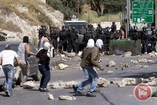
Dozens of Palestinians were injured in violent clashes across al-Tur and al-Issawiya neighborhoods in occupied East Jerusalem on Saturday as Palestinians protested the death of Muhammad Abu Ghannam, 17, shot dead by Israeli police late Friday.
Sources told Ma'an that the clashes in al-Tur were concentrated near the Mount of Olives and had broken out when Israeli forces stormed a Palestinian Martyrs' center and began indiscriminately firing tear gas canisters, which Palestinian youths responded to by throwing stones.
The 17-year-old Abu Ghannam, who came from al-Tur, was shot dead at Al-Zayyim checkpoint in occupied East Jerusalem after he allegedly attempted to stab Israeli checkpoint officers.
Israeli police claimed that the teenager began running toward a number of police officers at a checking station "wielding a large knife." A state of mourning was called for in al-Tur, which led to a mass strike, and witnesses reported that streets across the neighborhood were nearly empty as local schools and institutions closed for the day.
Palestinian Red Crescent official Dr. Amin Abu Ghazaleh said 26 Palestinians had been injured by rubber-coated steel bullets during the clashes, mostly in their upper bodies, and that around 50 had suffered excessive tear gas inhalation.He said that Israeli forces, including snipers positioned around al-Maqased Hospital, had targeted ambulance crews belonging to the Palestinian Red Crescent Society.
Two Palestinian medics were injured -- Ahmed al-Shalawdi, who was shot in his shoulder, and Fadi Abedi, shot in his lower extremities.
Abu Ghazaleh said the Palestinian Red Crescent had established a field clinic in the area as ambulances had been prevented from reaching the area.Meanwhile, in nearby al-Issawiya, a local committee member reported that Israeli forces had stormed the neighborhood just as students were finishing school.
Violent clashes broke out as Israeli forces attempted to block students and teachers from leaving the schools.Israeli forces reportedly fired tear gas canistersindiscriminatelyand dozens of Palestinians suffered excessive tear gas inhalation.
Abu Ghannam's father Muhammad told Ma'an that after identifying his son's face for Israeli security forces, he had been prevented from seeing his son's body and could not see where or how many times he had been shot.He said that Israeli intelligence informed him that his son's body would be delivered to the family on the condition that only 20 people attend the funeral.He told Ma'an that he had refused these conditions and demanded that his son's body be delivered to the family unconditionally.
Tensions have been running high in East Jerusalem since last summer when Jewish extremists kidnapped and murdered a 16-year-old Palestinian boy, Muhammad Abu Khdeir.There have been a number of attacks by Palestinians on both Israeli security forces and civilians.In the same time, Israeli forces have detained hundreds of Palestinians across East Jerusalem, including 600 alone in the two months after Abu Khdeir's death, and Israeli forces have also injured dozens of Palestinians.
Earlier this month, the UN reported that for the second time in three weeks Israeli forces using rubber-coated steel bullets had shot and injured a Palestinian child returning from school, on the second occasion a 13-year-old girl.
Sources told Ma'an that the clashes in al-Tur were concentrated near the Mount of Olives and had broken out when Israeli forces stormed a Palestinian Martyrs' center and began indiscriminately firing tear gas canisters, which Palestinian youths responded to by throwing stones.
The 17-year-old Abu Ghannam, who came from al-Tur, was shot dead at Al-Zayyim checkpoint in occupied East Jerusalem after he allegedly attempted to stab Israeli checkpoint officers.
Israeli police claimed that the teenager began running toward a number of police officers at a checking station "wielding a large knife." A state of mourning was called for in al-Tur, which led to a mass strike, and witnesses reported that streets across the neighborhood were nearly empty as local schools and institutions closed for the day.
Palestinian Red Crescent official Dr. Amin Abu Ghazaleh said 26 Palestinians had been injured by rubber-coated steel bullets during the clashes, mostly in their upper bodies, and that around 50 had suffered excessive tear gas inhalation.He said that Israeli forces, including snipers positioned around al-Maqased Hospital, had targeted ambulance crews belonging to the Palestinian Red Crescent Society.
Two Palestinian medics were injured -- Ahmed al-Shalawdi, who was shot in his shoulder, and Fadi Abedi, shot in his lower extremities.
Abu Ghazaleh said the Palestinian Red Crescent had established a field clinic in the area as ambulances had been prevented from reaching the area.Meanwhile, in nearby al-Issawiya, a local committee member reported that Israeli forces had stormed the neighborhood just as students were finishing school.
Violent clashes broke out as Israeli forces attempted to block students and teachers from leaving the schools.Israeli forces reportedly fired tear gas canistersindiscriminatelyand dozens of Palestinians suffered excessive tear gas inhalation.
Abu Ghannam's father Muhammad told Ma'an that after identifying his son's face for Israeli security forces, he had been prevented from seeing his son's body and could not see where or how many times he had been shot.He said that Israeli intelligence informed him that his son's body would be delivered to the family on the condition that only 20 people attend the funeral.He told Ma'an that he had refused these conditions and demanded that his son's body be delivered to the family unconditionally.
Tensions have been running high in East Jerusalem since last summer when Jewish extremists kidnapped and murdered a 16-year-old Palestinian boy, Muhammad Abu Khdeir.There have been a number of attacks by Palestinians on both Israeli security forces and civilians.In the same time, Israeli forces have detained hundreds of Palestinians across East Jerusalem, including 600 alone in the two months after Abu Khdeir's death, and Israeli forces have also injured dozens of Palestinians.
Earlier this month, the UN reported that for the second time in three weeks Israeli forces using rubber-coated steel bullets had shot and injured a Palestinian child returning from school, on the second occasion a 13-year-old girl.

Al Jazeera reports IAF planes targeted 155th and 65th brigades of the Syrian army, which deal with strategic weapons and long-range missiles, on the Syrian-Lebanese border; Al Arabiya reports Israel attacked 2 weapons convoys on Wednesday.
Israeli fighter jets allegedly hit Syrian and Hezbollah targets on the Syria-Lebanon border Friday overnight, Al Jazeera reported Saturday.
According to sources quoted by Al Jazeera, the attack in al-Qalamoun targeted the 155th and 65th Brigades of the Syrian army, which deal with strategic weapons and long-range missiles.
The sources reported several explosions in the Syrian towns of Al-Qutayfah, Yabroud and Qarah on the outskirts of Damascus.
Al Arabiya reported the attack targeted Syrian weapons depots, and that on Wednesday Israel allegedly attack two weapons convoys, reportedly killing one person.
The IDF declined to respond to the reports. Syrian regime-affiliated media and Hezbollah-affiliated media have yet to report the alleged attack.
According to foreign sources, Israeli air force have allegedly carried out several raids against targets in Syria, including depots storing weapons meant for Hezbollah, since the conflict there started over four years ago.
Though Israel had maintained a policy of neutrality regarding the Syrian war, the most recent strike was said to be in January, when Hezbollah commander Jihad Mughniyeh, the son of Lebanese terrorist Imad Mughniyah, was killed along with other Hezbollah fighters and a senior Iranian Revolutionary Guards commander.
Last December, Israeli warplanes reportedly struck weapons warehouses near Damascus.
Israel has never confirmed it carried out the strikes, but it says it has a policy of preventing arms transfers to militant groups including Hezbollah.
Israeli fighter jets allegedly hit Syrian and Hezbollah targets on the Syria-Lebanon border Friday overnight, Al Jazeera reported Saturday.
According to sources quoted by Al Jazeera, the attack in al-Qalamoun targeted the 155th and 65th Brigades of the Syrian army, which deal with strategic weapons and long-range missiles.
The sources reported several explosions in the Syrian towns of Al-Qutayfah, Yabroud and Qarah on the outskirts of Damascus.
Al Arabiya reported the attack targeted Syrian weapons depots, and that on Wednesday Israel allegedly attack two weapons convoys, reportedly killing one person.
The IDF declined to respond to the reports. Syrian regime-affiliated media and Hezbollah-affiliated media have yet to report the alleged attack.
According to foreign sources, Israeli air force have allegedly carried out several raids against targets in Syria, including depots storing weapons meant for Hezbollah, since the conflict there started over four years ago.
Though Israel had maintained a policy of neutrality regarding the Syrian war, the most recent strike was said to be in January, when Hezbollah commander Jihad Mughniyeh, the son of Lebanese terrorist Imad Mughniyah, was killed along with other Hezbollah fighters and a senior Iranian Revolutionary Guards commander.
Last December, Israeli warplanes reportedly struck weapons warehouses near Damascus.
Israel has never confirmed it carried out the strikes, but it says it has a policy of preventing arms transfers to militant groups including Hezbollah.
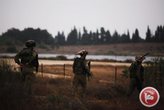
A Palestinian was shot and injured when Israeli forces opened fire east of Khan Younis, in the southern Gaza Strip.
Witnesses said that Israeli forces deployed along the border opened fire on Palestinian farmland, hitting one Palestinian man.
He has been taken to a hospital for treatment, while an Israeli army spokeswoman said she was looking into the incident.
Israeli forces have repeatedly opened fire on Palestinian civilians near the border since the ceasefire agreement signed Aug. 26, 2014 that ended a devastating 50-day war between Israel and Hamas. In March alone, there were a total of 38 incidents of shootings, incursions into the Strip, and arrests, according to the Palestinian Center for Human Rights (PCHR).
That was up from 26 incidents through February, and left seven Palestinians injured and one dead. The attacks come despite Israeli promises at the end of the ceasefire to ease restrictions on Palestinian access to the border region near the "security buffer zone".
According to PCHR, the "buffer zone", which Palestinians are prohibited from entering, "is illegal under both Israeli and international law."
The group said, according to Ma'an News Agency: "The precise area designated by Israel as a 'buffer zone' is not clear and this Israeli policy is typically enforced with live fire."
Israeli soldiers fired, on Friday at dawn, three artillery shells into an area in the northern part of the Gaza Strip, while navy ships fired dozens of rounds of live ammunition into the Gaza shore.
Witnesses said that Israeli forces deployed along the border opened fire on Palestinian farmland, hitting one Palestinian man.
He has been taken to a hospital for treatment, while an Israeli army spokeswoman said she was looking into the incident.
Israeli forces have repeatedly opened fire on Palestinian civilians near the border since the ceasefire agreement signed Aug. 26, 2014 that ended a devastating 50-day war between Israel and Hamas. In March alone, there were a total of 38 incidents of shootings, incursions into the Strip, and arrests, according to the Palestinian Center for Human Rights (PCHR).
That was up from 26 incidents through February, and left seven Palestinians injured and one dead. The attacks come despite Israeli promises at the end of the ceasefire to ease restrictions on Palestinian access to the border region near the "security buffer zone".
According to PCHR, the "buffer zone", which Palestinians are prohibited from entering, "is illegal under both Israeli and international law."
The group said, according to Ma'an News Agency: "The precise area designated by Israel as a 'buffer zone' is not clear and this Israeli policy is typically enforced with live fire."
Israeli soldiers fired, on Friday at dawn, three artillery shells into an area in the northern part of the Gaza Strip, while navy ships fired dozens of rounds of live ammunition into the Gaza shore.
